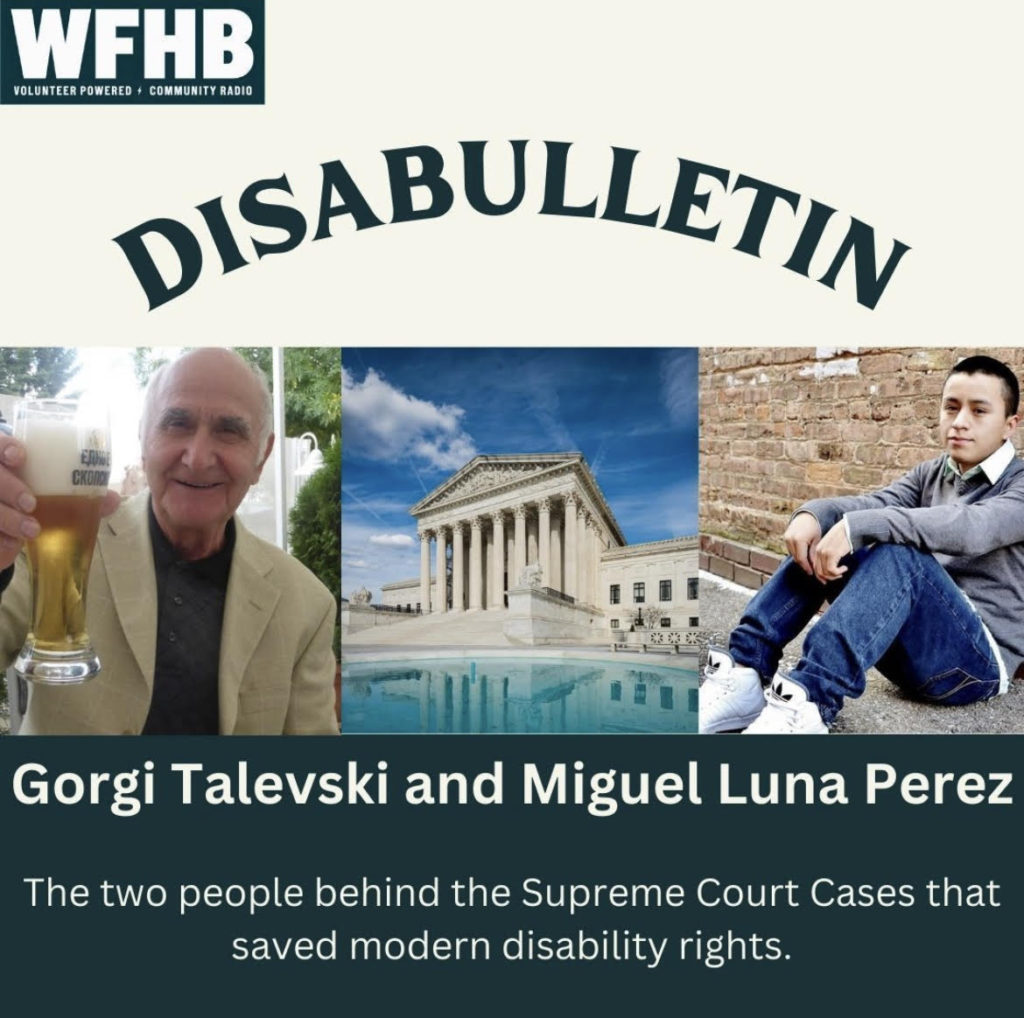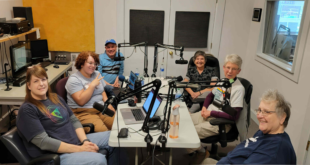Podcast: Play in new window | Download (Duration: 11:47 — 10.9MB)
Subscribe: RSS

***CORRECTION:THE CASE OF Fry V Napoleon Public Schools TOOK PLACE IN 2017, NOT 1986. RATHER, THE CASE OF FRY RULED THAT A 1986 LAW, the Handicapped Children’s Protection Act of 1986, DID NOT REQUIRE A SPECIAL EDUCATION PLAINTIFF TO EXHAUST ALL PROCESSES OF APPEALS UNLESS THE PLAINTIFF’S SPECIFIC CASE DEALT WITH A SPECIAL EDUCATION STUDENT’S RIGHT TO A FREE APPROPRIATE PUBLIC EDUCATION BEING VIOLATED. AS PEREZ WAS SUING FOR DAMAGES NOT COVERED UNDER THIS, HE DID NOT HAVE TO EXHAUST ALL APPEALS.***
And we’re back with Disabulletin following a brief research sabbatical concerning upcoming installments for our program.
With the Supreme Court’s docket empty until the first Monday of October, we review two significant Cases. In these cases, the Disability community asked the court critical questions regarding nursing home civil rights and Special Education rights respectively:
The first came out of our very own state of Indiana and concerned the late Gorgi Talevski, a resident at the Valparaiso Care and Rehabilitation Facility.
Talevski’s family sued the facility’s operators, the Marion County Health and Hospital Corporation (HHC), under Section 1983 of the US Code, which provides private citizens a cause of action, or right, to sue state or local government officials who violate said private citizen’s civil rights, and the Federal Nursing Home Reform Act of 1987 (FNHRH), which protects the civil rights of nursing home residents.
In the Supreme Court arguments held on November 8 of last year, the Talevski family argued they had the grounds to sue as their relative was allegedly the victim of civil rights violations, which included overmedication and involuntary transfer to a different nursing home located hours away from his family’s home. The question, in this case, was whether or not those benefitting under programs receiving federal Medicaid funds such as government-run nursing homes could sue such programs if their civil rights were violated.
On the opposite side, Marion HHC contested the case on the grounds that the statute known as Section 1983 did not confer such a right when it was enacted in the 19th century, its original purpose being to protect former slaves from further discrimination by the southern states.
Marion HHC also argued that even if a section of a law secures rights, HHC could defeat the lawsuit by arguing congress “did not intend” that section 1983 lawsuits be available under such rights.
Although the “rights” statute of the Federal Nursing Home Reform Act mentions nothing about congress intending to allow for civil rights lawsuits, it does create an administrative scheme “for inspections of nursing facilities, see §1396r(g), and authorizes governments to sanction and correct non-compliant facilities.” Therefore, there was no “incompatibility” present between the scheme and 1983.
On June 8, the Supreme Court ruled 7-2 that “The FNHRA [The Federal Nursing Home Reform Act] provisions at issue unambiguously create §1983-enforceable rights, and the Court discerns no incompatibility between private enforcement under §1983 and the remedial scheme that Congress devised.” In other words, the court ruled that those receiving the benefits of Medicaid programs do in fact have the right, or in legalese, a right of action, to seek compensation through the courts.
In the Majority opinion, Justice Ketanji Brown Jackson wrote, “At oral argument, HHC’s counsel remarked that the “right question” is “what rights are secured by law within the meaning of §1983… Section 1983 itself provides the answer. By its terms, §1983 is available to enforce every right that Congress validly and unambiguously creates; we will not impose a categorical font-of-power condition that the Reconstruction Congress did not.”
Justice Jackson added that the manner in which Section 1983 is applied does allow for a private right for nursing home residents to sue if their rights under the Federal Nursing Home Reform Act are violated.
As Marion HHC’s medical team violated both provisions of FNHRH regarding medication and the process of proper nursing home transfer by transferring Talevski improperly and giving him psychotropic medicine against his will, Talevski’s rights were therefore violated, thus creating a cause of action to sue.
Justice Amy Comey Barrett concurred with Jackson by citing a test set in a 2002 Supreme Court Case, Gonzaga V Doe, wherein Congress must have had the intention to “create rights for the intended beneficiaries.” Justice Comey Barrett also wrote that the FNRHRA satisfied the test because the law contained a “rights” statute for nursing home residents. However, Justice Comey Barrett clarified that normally Section 1983 actions are “the exception—not the rule—for violations of Spending Clause statutes”. This is because “the typical remedy for state noncompliance with federally imposed conditions is not a private cause of action for noncompliance but rather action by the Federal Government to terminate funds to the State.”
On the dissenting side, Justice Clarence Thomas contended that throughout American history, such Spending clause conditions were primarily viewed as a contract rather than as laws between the state and federal government. Thomas argued that such regulations constitute what is known as commandeering of the states, or when the federal government oversteps its boundaries by pressuring states to pass or not pass laws.
Justice Samuel Alito joined Thomas in the dissent by arguing that by specifying limited remedies for federal authorities and tasking States with determining the consequences for violations of such obligations prior to receiving funds, there is a clear division of authority that ensures States retain their historical control over nursing-home regulation.” Allowing Section 1983 suits will upset this balance by allowing any plaintiff to demand damages regardless of the remedial scheme that States establish pursuant to their explicit authority under the Act.”
In the Talevski Camp, Shira Wakschlag, senior director of legal advocacy and general counsel for advocacy organization The Arc said to WFYI Indianapolis “This really has broad implications in a whole variety of areas for people with disabilities and the people that we serve.” On the Marion HHC side, a statement from the organization to WFYI read, “With the Court’s definitive answer today that Medicaid-supported nursing home residents have both administrative and federal court remedies for alleged violations, HHC will continue to work to manage those operations safely and effectively and analyze the impact of the decision on those public resources.”
The second case, Perez V Sturgis Public School District, also concerned civil rights, albeit in the field of Special Education. The issue at hand:Could a Deaf Student named Miguel Luna Perez of Sturgis Michigan sue for monetary damages under the Americans with Disabilities Act (ADA) if the Individuals with Disabilities Education Act (IDEA) did not allow him to do so and was he required to exhaust all court appeals?
The ADA bars programs which receive federal funding from practicing discrimination against individuals with disabilities while the IDEA act entitles individuals with disabilities to a FAPE or Free appropriate public education.
Miguel Luna Perez of Sturgis, Michigan was denied access to a professional sign language interpreter and was instead provided with an ineffective one over the course of 12 years. In that time, Perez’s parents were falsely told that their son was on his way to graduation, only to receive a certificate of completion instead of a diploma upon completing his senior year of high school instead of a diploma.
After receiving the news, the Perez family filed a lawsuit against the Michigan Department of Education and the Sturgis School Board, on the grounds that the school violated both the IDEA and ADA acts.
However, the Sturgis School District offered a settlement to pay for Perez to attend the Michigan School for the Deaf and compensate the family’s legal fees, which would satisfy Perez’s lawsuit under the IDEA should the family accept.
The family accepted the settlement but then filed a lawsuit for monetary damages under the ADA which entitles victims of disability discrimination to pursue such legal remedies separately, unlike the IDEA Act which does not permit such lawsuits.
The question again was, by accepting the district’s settlement, had the Perez family forfeited their right to further litigation for monetary damages under the ADA, instead of going through the lengthy process of appeals for both claims.
This process is known in legal speak as exhaustion and is mandated by the IDEA, a claim echoed by Sturgis district lawyer Shay Devoretsky in Last week’s hearing.
In the Supreme Court arguments held on January 18, Perez’s lawyer Ramon Martinez argued that although Perez had settled his claims under the IDEA, he could still pursue his claim for monetary damages separately under the ADA. Devoretsky cited Section §1415(l) of the IDEA which contains two features. The first clause focuses on “remedies” and sets forth this general rule: “Nothing [in IDEA] shall be construed to restrict” the ability to seek “remedies” under “other Federal laws protecting the rights of children with disabilities.” The second clause carves out an exception: Before filing a civil action under other federal laws “seeking relief that is also available” under IDEA, “the procedures under [§1415](f) and (g) shall be exhausted.”
In a 9-0 unanimous decision authored by Justice Neil Gorsuch released on March 21, the court ruled that although Perez could not sue for damages under the IDEA act, he could pursue damages under other federal laws such as the ADA. In his opinion affirming the decision, Justice Gorsuch wrote about a prior case, 2017’s Fry V Napoleon Public Schools. Justice Gorsuch wrote, “In a prior case Fry, the Court held that §1415(l)’s exhaustion requirement does not apply unless the plaintiff “seeks relief for the denial of a free and appropriate public education because that is the only ‘relief’” IDEA’s administrative processes can supply. This case presents an analogous but different question—whether a suit admittedly premised on the past denial of a free and appropriate education may nonetheless proceed without exhausting IDEA’s administrative processes if the remedy a plaintiff seeks is not one IDEA provides. In both cases, the question is whether a plaintiff must exhaust administrative processes under IDEA that cannot supply what he seeks. And here, as in Fry, we answer in the negative.”
Therefore, Justice Gorsuch re-affirmed the court’s prior rulings wherein a plaintiff does not have to go through the lengthy process mandated by the IDEA Act unless they are seeking A Free and Appropriate Public Education.
According to the National Law Review, such a decision could spell trouble for school districts as it could result in an increase in cases by families seeking monetary damages in contrast to appropriate educational needs for their children.
However, according to Education Weekly, “It will make it easier for other students with disabilities and their families to bypass often slow-moving administrative proceedings under the IDEA when their chief claim is for damages under other federal laws such as the ADA or the Rehabilitation Act of 1973.”
Next time, we continue our special report on the History of Special Education in the United States by resuming the ARC of Washington’s efforts towards initial Special education law and the first ever such law to be passed in the United States courtesy of the organization’s efforts.
We’ll also resume our coverage of the ongoing case Westchester Disabled on The Move (WDOMI) V. Lyft and provide a summary of recent developments in the case via a discussion with WDOMI’s attorney in the case, Jeremiah Frei-Pearson and a representative from WDOMI.
 WFHB Bloomington Community Radio
WFHB Bloomington Community Radio


